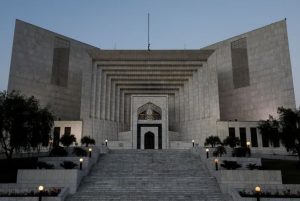ISLAMABAD: The Supreme Court has set two rules for kids who want to get money from their grandfathers. An order made by Justice Syed Mansoor Ali Shah that was four pages long said, “The father of the child must be poor and unable to provide for that child’s upbringing, and the grandfather of the child must be wealthy.”

A bench of three judges, led by Justice Mansoor, decided whether a child support order against the father could be carried out against the grandfather or whether the child would have to file a suit for support against his grandpa.
It also said that “the grandfather is not under any obligation to maintain his grandchild” if either of the conditions wasn’t met. Hence, these two conditions can also be used as a defense by a grandpa who is being sued for child support by his grandchild.
The judge said that a child who wanted to get money from his grandpa had to show these two things. The grandfather had to be given a chance to defend himself by denying either of these two things.
“This is the requirement of the fundamental right guaranteed by Article 10A of the Constitution of Pakistan, which mandates that for the determination of his civil rights and obligations, a person shall be entitled to a fair trial and due process.”
It was his legal duty to pay his grandchild’s support. The grandfather must be given a fair hearing and due process so that the case can be decided. If both conditions are met, a grandfather is required to take care of his grandchild. These are real statements, not legal ones.
“Their existence or non-existence can, therefore, only be proved through producing their respective evidence by the parties in a properly instituted suit for maintenance.” This kind of proof couldn’t be used in the execution process, and the court in charge of the execution couldn’t make a decision based on these facts.
In an execution process, recording evidence and making findings based on these facts would be pointless because an executing court could not change the decree or carry out the decree against someone who was not a party to the suit, even if it made a positive finding.
“Furthermore, the Family Courts Act 1964 sets out a process for how claims of maintenance should be heard and decided by the Family Courts.” If someone makes such a claim against a grandfather, it affects his property. As a result, he has the right to be treated with according to the law, which is the Family Courts Act, as stated in Article 4 of the Constitution.
“So, we believe that a child support order against the father cannot be carried out against the grandfather. Instead, the child must file a suit for support against his grandfather if no property of the father, who is the judgment debtor, can be found to carry out the order.”
According to Islamic law, if a child’s father died or was too poor to pay for his child’s upkeep, the responsibility to do so fell on the child’s grandfather, as long as he had enough money to do so. The court pointed out that the petitioner (grandfather) was not a party to the lawsuit that his grandson filed against his father, nor was there any order against him.
“A decree that was not passed against the petitioner cannot be executed against him or his property.”By overturning the order in question, the petitioner’s writ petition is accepted, which says that the executing court’s orders from September 7th and October 17th, 2018 were made without legal power and have no legal effect.
Because of this, the petitioner’s request to free his property from the lien was granted.
It should be made clear, though, that the minor decree-holder can file a lawsuit for maintenance against the petitioner, who is his grandfather if he is told to do so. If this happens, the Family Court can make an order for interim maintenance of the minor at the right time in the lawsuit if it is satisfied that the two conditions that make a grandfather responsible for supporting his minor grandchild are met.




















































